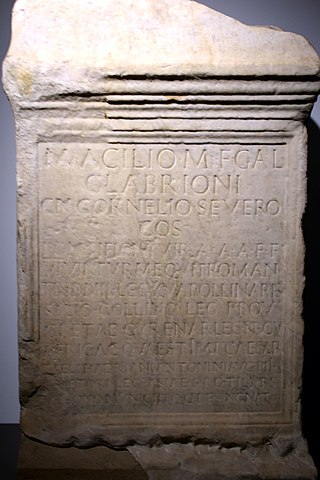Related Research Articles
Severus is the name of various historical and fictional figures, including:

The gens Claudia, sometimes written Clodia, was one of the most prominent patrician houses at ancient Rome. The gens traced its origin to the earliest days of the Roman Republic. The first of the Claudii to obtain the consulship was Appius Claudius Sabinus Regillensis, in 495 BC, and from that time its members frequently held the highest offices of the state, both under the Republic and in imperial times.

The gens Julia was one of the most prominent patrician families in ancient Rome. Members of the gens attained the highest dignities of the state in the earliest times of the Republic. The first of the family to obtain the consulship was Gaius Julius Iulus in 489 BC. The gens is perhaps best known, however, for Gaius Julius Caesar, the dictator and grand uncle of the emperor Augustus, through whom the name was passed to the so-called Julio-Claudian dynasty of the first century AD. The nomen Julius became very common in imperial times, as the descendants of persons enrolled as citizens under the early emperors began to make their mark in history.
The gens Fulvia, originally Foulvia, was one of the most illustrious plebeian families at ancient Rome. Members of this gens first came to prominence during the middle Republic; the first to attain the consulship was Lucius Fulvius Curvus in 322 BC. From that time, the Fulvii were active in the politics of the Roman state, and gained a reputation for excellent military leaders.
Gnaeus, also spelled Cnaeus, was a Roman praenomen derived from the Latin naevus, a birthmark. It was a common name borne by many individuals throughout Roman history, including:

The gens Cornelia was one of the greatest patrician houses at ancient Rome. For more than seven hundred years, from the early decades of the Republic to the third century AD, the Cornelii produced more eminent statesmen and generals than any other gens. At least seventy-five consuls under the Republic were members of this family, beginning with Servius Cornelius Maluginensis in 485 BC. Together with the Aemilii, Claudii, Fabii, Manlii, and Valerii, the Cornelii were almost certainly numbered among the gentes maiores, the most important and powerful families of Rome, who for centuries dominated the Republican magistracies. All of the major branches of the Cornelian gens were patrician, but there were also plebeian Cornelii, at least some of whom were descended from freedmen.
The gens Pinaria was one of the most ancient patrician families at Rome. According to tradition, the gens originated long before the founding of the city. The Pinarii are mentioned under the kings, and members of this gens attained the highest offices of the Roman state soon after the establishment of the Republic, beginning with Publius Pinarius Mamercinus Rufus, consul in 489 BC.
Servius Cornelius Lentulus Maluginensis was a Roman statesman, who flourished during the reigns of Augustus and Tiberius. He was flamen dialis, and consul suffectus in AD 10.
Gnaeus Claudius Severus was a Roman senator and philosopher who lived in the Roman Empire during the 2nd century AD.
Cossus Cornelius Lentulus Gaetulicus was a Roman senator and general, who was consul in 1 BC with Lucius Calpurnius Piso the Augur as his colleague.
Gnaeus Pinarius Cornelius Clemens was a Roman military officer and senator who was appointed Suffect consul during the reign of Vespasian. He is primarily known through inscriptions.
Publius Cornelius Lentulus Marcellinus was a Roman Senator who was elected Roman consul in 18 BC, with Gnaeus Cornelius Lentulus as his colleague. During his consulship, the Senate and the Roman assembly again conferred upon the Roman emperor Augustus his extraordinary promagisterial authority and his Tribunician power.
Cossus Cornelius Lentulus was a Roman senator who flourished during the Principate. He was the consul posterior as the colleague of the emperor Nero in AD 60.

Manius Acilius Glabrio Gnaeus Cornelius Severus was a senator of the Roman Empire. He was consul ordinarius in 152 with Marcus Valerius Homullus as his colleague. Acilius Glabrio is known almost solely from surviving inscriptions.
Appius Annius Gallus was a Roman senator and general who flourished during the first century. He held the office of suffect consul in 67 with Lucius Verulanus Severus as his colleague. The suffect consul of 67 is commonly identified as the general who supported Otho during the Year of the Four Emperors.
The gens Sallustia, occasionally written Salustia, was a plebeian family at ancient Rome. Members of this gens are first mentioned in the time of Cicero, and from that time they attained particular distinction as statesmen and writers. The most illustrious of the family was the historian Gaius Sallustius Crispus, who wrote valuable works on the Jugurthine War and the Conspiracy of Catiline, which still exist.
Gnaeus Caecilius Simplex was a Roman senator, who was active during the middle of the first century AD. The ephemeral emperor Vitellius appointed him consul during the Year of Four Emperors with Gaius Quinctius Atticus as his colleague, replacing Martius Macer and Quinctius Atticus. Many believed Simplex had bribed Vitellius to be appointed to this magistracy, and he was accused of this in the Senate; however Vitellius defended Simplex, and "afterwards bestowed on Simplex a consulship that had not been bought with crime or money."
Gnaeus Pinarius Aemilius Cicatricula was a Roman senator, who was active during the reign of Domitian. He was suffect consul in the nundinium of November-December 72 as the colleague of Sextus Marcius Priscus. He is known entirely from inscriptions.